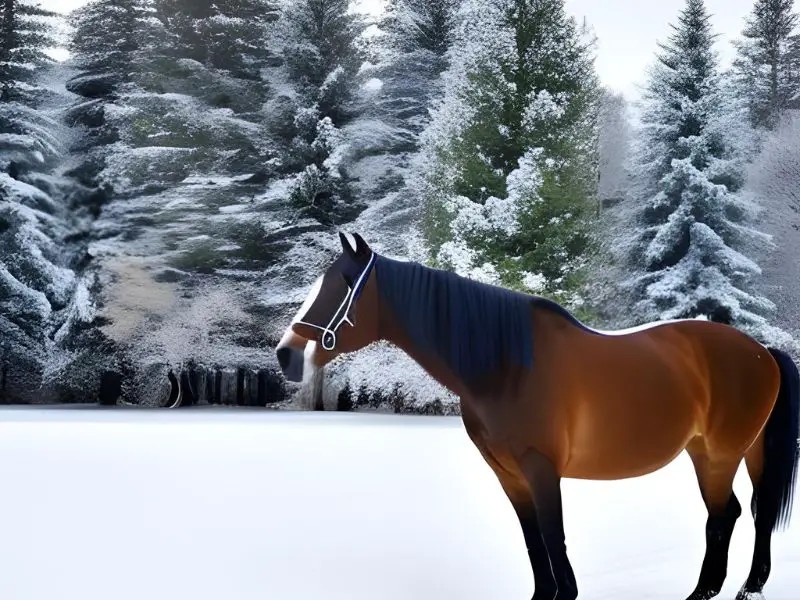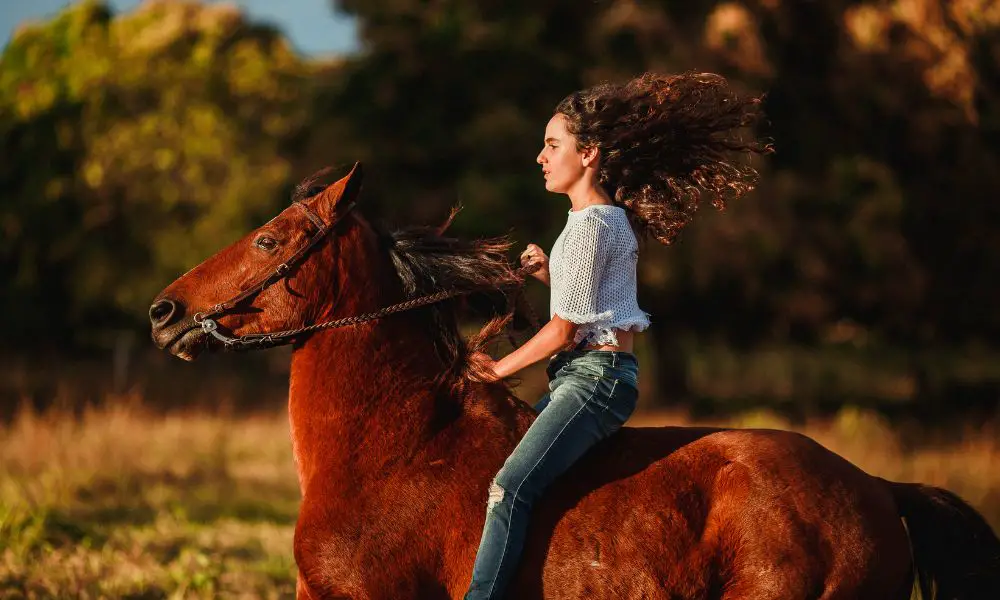How cold can horses stay outside? Horses are hardy animals that can survive in cold climates. Generally speaking, horses can withstand temperatures as low as -40 degrees Fahrenheit (-40°C). However, this is only possible if they can access shelter and a warm sleeping place.
In very cold weather, the horse’s coat will grow thicker and longer for insulation. Horses also benefit from having plenty of food available during colder periods since their bodies need extra calories to generate heat.
If a horse is exposed to extreme cold without proper protective measures such as adequate shelter or additional nutrition, it may suffer hypothermia or frostbite, which can be life-threatening.
Horses can withstand cold temperatures better than humans and are naturally well-adapted for winter weather. However, horse owners should still be mindful of how cold it gets outside and provide adequate shelter to their animals when necessary.
Horses that stay outdoors in the winter need good quality hay or other nutritious feed, along with plenty of fresh water to help them maintain their body temperature and keep warm.
With the right care and attention, horses can stay comfortable even during very cold temperatures.
When to Bring Horses in for Winter
As winter approaches, it is important to consider the needs of your horses and provide them with adequate shelter. Horses should be brought in from pastures and paddocks as soon as temperatures drop below 40°F or when snow accumulates on the ground. Horse owners should also monitor their horse’s body condition during cold weather, providing extra hay and grain if necessary to maintain a healthy weight.

Can Horses Be Kept Outside in Winter?
Yes, horses can be kept outside in winter, provided the necessary precautions are taken. It is important to ensure that your horse has access to shelter from the wind and rain. Preferably a three-sided shed or stall with hay bales providing insulation. You also need to ensure they have plenty of food and water as well as blankets, especially if temperatures drop below freezing.
If possible, provide them with bedding, such as straw, to keep them warm at night and during cold weather spells. Keep an eye out for signs of hypothermia or frostbite and take appropriate measures if any occur. Lastly, check regularly for hoof problems due to icy ground conditions so you can treat them promptly if necessary.
By following these simple tips, you should be able to keep your horse safe outdoors during winter months without risking their health or wellbeing!
Is It OK to Leave Horses Out in the Cold?
No, it is not OK to leave horses out in the cold. Horses are vulnerable to extreme temperatures and can suffer from hypothermia or frostbite if exposed. Cold weather also reduces their resistance to disease and parasites, while a lack of shelter makes them more prone to injury.
Further, some horse illnesses become exacerbated when exposed to frigid temperatures without protection. Therefore, it is important that horse owners provide adequate shelter for their animals during winter months so they can stay warm and healthy. Proper housing should include an insulated barn with a dry floor, access to hay, plenty of fresh water, good air circulation, and appropriate bedding material such as straw or shavings for insulation during especially cold periods.
Additionally, blankets may be used for extra warmth on particularly chilly days but should only be put on after the animal has been groomed clean—dirty coats hold moisture, which can make the animal colder faster if covered up with a blanket too soon after exercise or grooming sessions. Finally, any outdoor turnout areas should be well-drained and free from snow accumulation that could lead to joint stiffness due to exposure or deep mud/ice patches where hooves may become stuck or injured over time.
Keeping Horses Warm With Proper Blanketing
When old man winter comes knocking, horse owners must be ready to bundle their four-legged friends up. Choosing the right blankets and layers is key to keeping your horse cosy and content. Turnout blankets made of waterproof yet breathable fabrics help block wind and precipitation. Look for a heavyweight inner lining for insulation against frosty temps. Don’t forget the belly straps and leg straps to prevent rubbing. Fleece coolers underneath provide supplementary warmth. Daily checks allow you to monitor for overheating and ensure proper fit. With the right blanketing, your horse can stay toasty warm all winter long.
Adjusting Your Horse’s Diet for Colder Weather
As the mercury drops, your horse’s nutritional needs rise. Increase caloric intake by 10-15% to provide extra fuel for internal heating. Keep that internal furnace stoked with ample good quality hay – -feed at 2-3% of body weight daily.
Add concentrates to the mix to supply additional calories and nutrients. Fresh, unfrozen water is a must to stay hydrated when cold weather sets in. Monitor your horse for signs of dehydration, like skin tenting or super concentrated urine.
Avoid feeding frozen or icy forage, which could cause choking or colic. With some adjustments to diet, your horse can stay healthy and happy even when Old Man Winter comes to town.
Staying Alert for Cold-Related Equine Illness
Frigid temps can take a toll on your horse’s health. Be on the lookout for telltale signs of cold-related illness. Symptoms like shivering, lethargy, stiffness and low body temperature may indicate hypothermia – a dangerous condition requiring prompt veterinary attention.
Frostbite can also occur, especially on the ears, fetlocks and face, causing numbness and tissue damage. The dry air and dust in the stable may lead to respiratory infection. Stress from the cold can trigger diarrhoea or colic, too. Make prevention a priority by minimizing exposure and monitoring closely. If you spot any of these red flags, call your vet right away. Staying alert and proactive keeps your horse happy and healthy.
How Can You Tell If a Horse Is Cold?
When it comes to assessing whether a horse is cold, there are several key signs that you should look out for. Firstly, the horse’s body temperature is usually lower than normal – often below 37°C (98.6°F). Secondly, your horse may display physical signs of discomfort, such as shivering or huddling up against other horses or objects to find warmth and shelter from the cold weather.
Additionally, if your horse has been exposed to extreme temperatures for prolonged periods, then their pulse rate and breathing rate can become elevated due to stress.
Lastly, if your horse appears lethargic and unwilling to move around as much as usual, this could also be a sign that they are feeling particularly cold – so make sure you keep an eye on them during colder months!
Are Horses Sensitive to the Cold?
Horses are surprisingly sensitive to cold weather. They have a thick winter coat to keep them warm, but they can still feel the chill of the air when it gets cold. In addition, their hooves are particularly sensitive to extreme temperatures and can become cracked or brittle in colder conditions.
To protect your horse from the effects of the cold, you should provide him with a shelter that is well-insulated and draft-proof so he has somewhere cosy and comfortable to rest during colder days. It’s also important that his stall is clean and dry so he doesn’t get chilled when lying down or standing up for long periods.
You should also make sure your horse’s diet includes plenty of calories, as this helps generate more body heat, which keeps him warm even in freezing temperatures.
Finally, if your horse does suffer from any signs of discomfort due to extreme cold, such as shivering or frostbite, seek veterinary advice immediately, as these can be serious health issues for horses if not addressed promptly.
How Horses Stay Dry And Warm In The Winter On Our Morning Horsey Check
Conclusion
This article has shown us that horses can handle relatively cold temperatures, but they should be kept a stable if the temperature drops below freezing. Horses with adequate shelter, hay, and water will stay warm and comfortable during cold weather. With proper care and preparation, horse owners can keep their horses healthy all winter.
Janet G Kulick is an experienced horse rider, trainer, and owner of the informative horse blog, Horseray.com. Her engaging writing style and wealth of knowledge on horse care, riding, and training make her a trusted source for horse enthusiasts worldwide.


